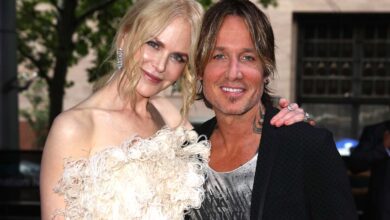Aimee Lou Wood Talks Managing Her Mental Health amid Fame
:max_bytes(150000):strip_icc():format(jpeg)/Aimee-Lou-Wood-092925-2730687831824a66b5833554ad452eeb.jpg)
NEED TO KNOW
- Aimee Lou Wood suffered body dysmorphia, bulimia and social anxiety as a teenager, and was diagnosed with ADHD earlier this year
- The actress said some of those mental health struggles still come up as her career advances, but she’s learned how to manage them
- She said she now embraces her neurodiversity as a “superpower” that allows her to succeed as an actress
Aimee Lou Wood is sharing how she’s been managing her mental health as she navigates fame.
In an interview with the Radio Times, published Sept. 29, the White Lotus star opened up about her budding international career and how being in the spotlight can affect her mental health.
The British actress, 31, suffered body dysmorphia, bulimia and social anxiety as a teenager. Throughout her career, she said she was often labeled as “quirky” and “funny,” which she initially thought was “a little bit hurtful” and impacted her self-esteem.
However, following her breakout role on Sex Education, Wood discovered the number of fans who connected with her, which gave her a new outlook on life. And that’s what she reminds herself of whenever any insecurities creep up and create added pressure.
“It gives me confidence on the days where sometimes that little demon comes back up,” she told the outlet. “I get it so bad after social situations: obsessive, repetitive thoughts of, ‘Did I really say that? That was weird. Why did you say that?’ but then I think of those people who thank me for being weird because it means they can embrace their weirdness.”
“I still have moments when I’m really overwhelmed and stressed and I feel it coming back up, like, ‘I could just take back control by not eating…’ Then I go, ‘No, I have to [eat]’ and I catch that and try not to get burnt out,” she explained.
The PEOPLE Puzzler crossword is here! How quickly can you solve it? Play now!
Amy Sussman/Getty
What’s also helped Wood is being diagnosed with ADHD earlier this year. She’s also undergoing additional testing to see if she is on the autism spectrum. She said her diagnosis was a relief, and that she now embraces her neurodiversity as a “superpower” that allows her to succeed as an actress.
“I don’t need everyone to understand me,” she said. “The people that get me, get me. The anxiety and feelings of inadequacy come from trying to meet other people’s expectations, but what’s so moving is that when I unmask, other people do too. The exhaustion and shame comes from covering things up, but it’s freeing when you say, ‘My brain doesn’t work like that.’”
Never miss a story — sign up for PEOPLE’s free daily newsletter to stay up-to-date on the best of what PEOPLE has to offer, from celebrity news to compelling human interest stories.
“Growing up, I felt a deep need to be ‘normal,’ but then I realised all my favourite people, all the people I admired, were weird — even my favourite characters, like Jane Eyre,” she continued. “Acting has shifted how I feel about myself. I used to hate how my face was so expressive but going into my 30s, I don’t want to miss out on life because I’m worried about how I’m being perceived. Beauty is internal and I’m my own human-shaped self, and that’s OK. I don’t need to fit into any box.”
If you or someone you know needs mental health help, text “STRENGTH” to the Crisis Text Line at 741-741 to be connected to a certified crisis counselor.
If you or someone you know is struggling with an eating disorder, The Alliance for Eating Disorders provides a fully-staffed helpline at 1-866-662-1235, as well as free, therapist-led support groups.
Credit to Nypost AND Peoples



